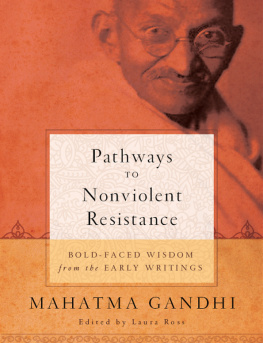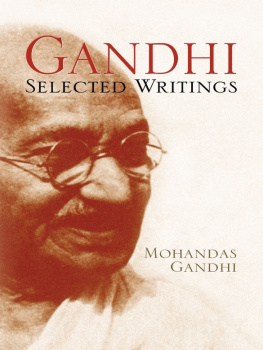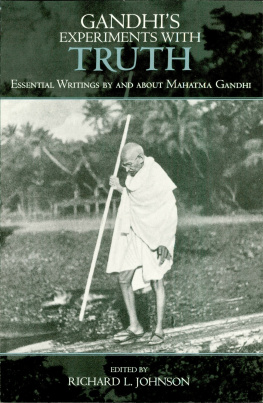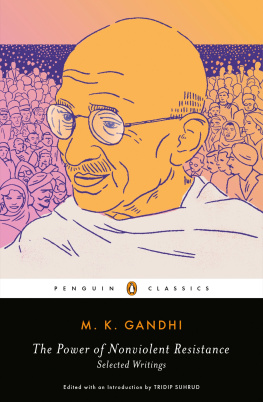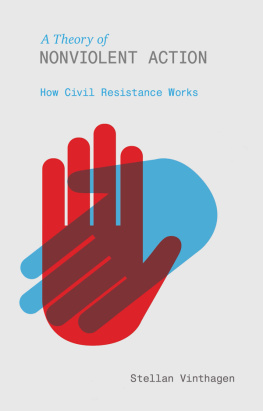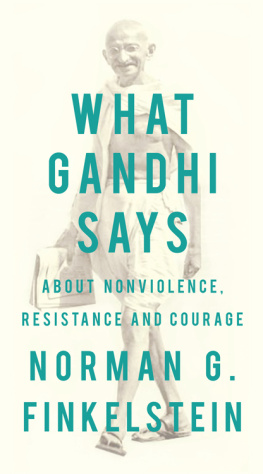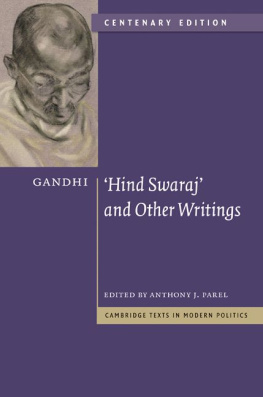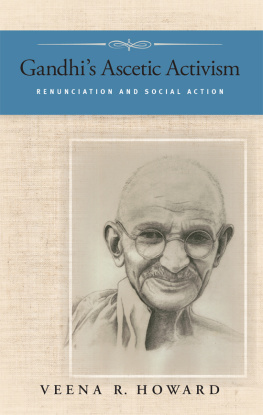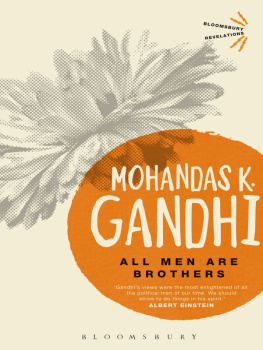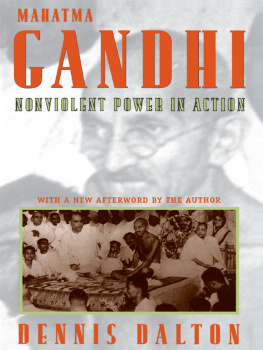Pathways
TO
Nonviolent
Resistance
BOLD-FACED WISDOM
from the EARLY WRITINGS

MAHATMA GANDHI
Edited by Laura Ross


STERLING and the distinctive Sterling logo are registered trademarks of Sterling Publishing Co., Inc.
2013 by Sterling Publishing Co., Inc.
All excerpts from The Collected Works of Mahatma Gandhi.
All rights reserved. No part of this publication may be reproduced, stored in a retrieval system, or transmitted in any form or by any means (including electronic, mechanical, photocopying, recording, or otherwise) without prior written permission from the publisher.
ISBN 978-1-4549-0622-3
2 4 6 8 10 9 7 5 3 1
www.sterlingpublishing.com
Contents


Life is greater than all art. I would go even further and declare the man whose life comes nearest to perfection is the greatest artist; for what is art without the sure foundation and framework of noble life?

I ndias political and spiritual leader, Mohandas Karamchand Gandhi (18691948), known out of respect as Mahatma (Great Soul), led his countrys struggle for independence and crusaded for the basic human rights of people everywhere. His methods, honed over decades of firsthand engagement in struggles around the world, were based on nonviolent resistance and civil disobedience. His teachings and writings have had a profound influence on the most important civil rights leaders of our time, including Martin Luther King Jr. and Nelson Mandela. Upon Gandhis death, Albert Einstein proclaimed, generations to come will scarce believe that such a one as this ever in flesh and blood walked upon this earth.
A prolific writer throughout his life, Gandhis works comprise more than ninety volumes. From his early days as a law student in England and a young lawyer in India, through his twenty-one years as an activist in South Africa (a period crucial to the development of his political views, as well as his leadership skills), and following his return to his native country, Gandhi wrote heartfelt essays, articles, and speeches outlining his most deeply held beliefs. From an early age, he seemed to understand his own power to persuade and guide others, and clearly felt a strong personal responsibility to improve the worldby both influence and example.
Over the course of his lifetimebrutally ended in 1948 by an assassins bulletGandhi campaigned fervently to eliminate poverty, improve the lot of women, build bridges between religious and ethnic groups, end the scourge of untouchability, promote economic self-reliance, andabove allwin the independence of India.
Much of Gandhis work has been published, including an autobiography and various compilations of his speeches and political works. This volume takes a new approach. Focusing on his formative years, Pathways to Nonviolent Resistance features examples of Gandhis early workthe foundation upon which his lifelong philosophy was built. In addition to excerpts from his published works, it brings together previously uncollected speeches, letters, articles, and other documents drawn from the first thirty years (from roughly 1893 to 1923) of his life as an activist, reformer, and thinker. Divided into chapters devoted to his most significant concepts, the goal of the book is to shed new light on Gandhis revolutionary ideas by tracing them back to their earliest sources and influences.
As you immerse yourself in Gandhis thoughts, pay particular attention to the passages and ideas that have been highlighted to assist you in understanding the most significant ideas and information. At regular intervals, For Further Thought passages comment on the text youve just read and offer questions to provoke contemplation of a variety of topics. Youll find that Gandhis work has much to offer todays reader.
Travel back to the early life and works of Mahatma Gandhi and consider not only the influence he had during his lifetime, but also how his beliefs are still being practiced around the world today. You are sure to emerge from the experience with a deeper appreciation for the work of one of the worlds greatest humanitarians.
Laura Ross


It is beneath human dignity to lose ones individuality and become a mere cog in the machine.

G andhis struggle for his nations rights and his relentless quest for personal human salvation were inextricably entwined. Throughout his life, he wrote about bothoften within the same pieces. Dominion over the self, Gandhi believed, was the place to start and the key to freedom and responsibility in the world at large.
Many of his earliest writings focus on human rights and the imperiled dignity of Indians in the West. Yes, Indians had their own customs, beliefs, and languageswhich he believed were critical to preservebut couldnt they be accepted as they were, appreciated as different in demeanor but equally human? A deeply godly man, he was tolerant of all religions and spoke out against prejudice directed toward all races.
As he matured, Gandhi developed a series of rigoroussome would say onerousdisciplines for himself and others to follow. (He strove, always, to embody the perfect example of all that he asked of others.) Among these personal strictures were vegetarianism, celibacy, periodic fasting, and abstinence from alcohol, coffee, teaeven cocoa. In this chapter, you will find his earliest commentary on these practicesas well as the roots of his core beliefs about human rights and responsibilities.
A N U NWELCOME V ISITOR
(The Natal Advertiser, May 29, 1893)
Durban, May 26, 1893
To the editor, The Natal Advertiser
Sir,
I was startled to read a paragraph in your todays issue referring to myself, under the heading, An Unwelcome Visitor. I am very sorry if His Worship the Magistrate looked at me with disapproval. It is true that on entering the Court I neither removed my head-dress nor salaamed, but in so doing I had not the slightest idea that I was offending His Worship, or meaning any disrespect to the Court. Just as it is a mark of respect amongst the Europeans to take off their hats, in like manner it is in Indians to retain ones head-dress. To appear uncovered before a gentleman is not to respect him. In England, on attending drawing-room meetings and evening parties, Indians always keep the head-dress, and the English ladies and gentlemen generally seem to appreciate the regard which we show thereby. In High Courts in India those Indian advocates who have not discarded their native head-dress invariably keep it on.
As to bowing, or salaaming as you would call it, I again followed the rule observed in the Bombay High Court. If an advocate enters the Court after the judge has taken his seat on the bench he does not bow, but all the advocates rise up when the judge enters the Court, and keep standing until the judge has taken his seat. Accordingly, yesterday when His Worship entered the Court I rose up, and took my seat only after His Worship had done so.

